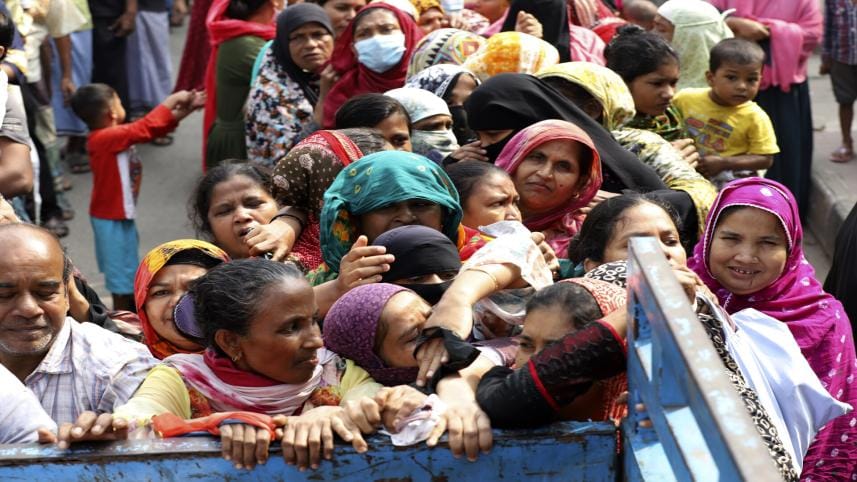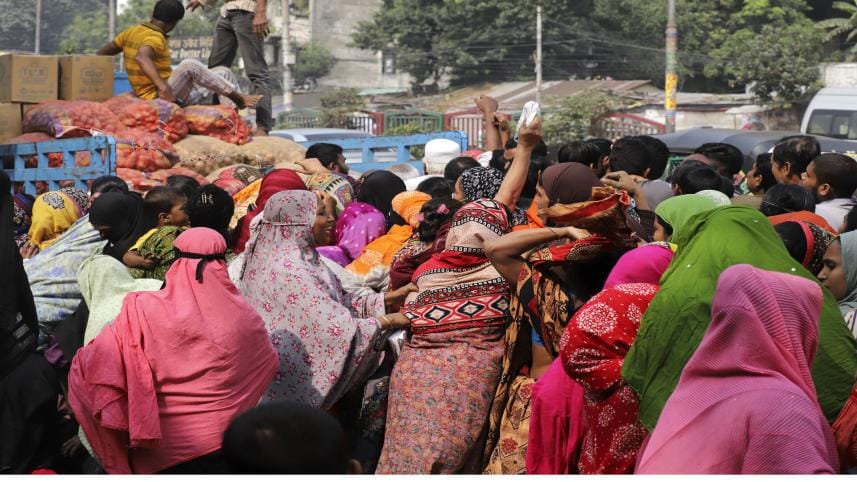Will coming months offer any relief from high inflation?

Nowadays, Dhaka city residents are familiar with scenes of men and women queuing up behind trucks of public agencies selling essentials -- including rice, edible oil and pulses -- at prices below the market rates.
And there is no sign of the lines becoming shorter.
Instead, the queues are becoming longer as new faces like Rehana Hosen join up to buy key food items at subsidised prices in a desperate effort to ensure necessities for their families in the face of inflation, which has been stubbornly high for more than one year.
For Rehana, a mother of two children who resides in the city's Mirpur area, the spiralling prices of food and non-food items deepened her distress and she, like many others, is waiting for the day that will bring some relief.
But her wait for a respite from elevated prices, as analysts said, is not going to be over soon -- at least not in the next two to three months.
Food inflation, which stood at 12.56 percent in October this year, the highest in at least a decade, may ease to some extent as winter vegetables have started arriving in the market at higher volumes, and farmers have also begun harvesting Aman rice, the second biggest rice crop in the country.
However, the real risk lies in the case of imported items, particularly food, not due to prices but because of the depreciation of the taka against the US dollar.
Globally, prices of food and other key commodities have been falling.
Prices of agricultural commodities are expected to decline next year as supply rises, the World Bank said in its Commodity Markets Outlook at the end of last month.
The United Nations' Food and Agriculture Organisation said earlier this month that global supplies and production of wheat and oilseeds, for which Bangladesh relies heavily on imports, are expected to remain at a comfortable level in 2023-24.
The exception is sugar, production of which is forecast to decline in 2023-24 and fall short of global consumption. As Bangladesh meets 98 percent of its sugar requirements through imports, it is already paying high prices.
And the increased cost of US dollars has been adding to the price of imported commodities, ranging from sugar and wheat to onions, pulses and petroleum.
The taka has lost around 19 percent value against the US dollar since the fiscal year 2021-22 and the devaluation is yet to stop as a shortage of the foreign currency continues in the country.
"Exchange rate is a factor for imported items," said Md Habibur Rahman, chief economist at the Bangladesh Bank (BB). "If prices remain steady, there will not be that much of an effect even if the exchange rate rises slightly," he said.
Officially, bankers are supposed to buy the greenback at Tk 110 and sell for Tk 110.5 each.
This rate, bankers and businesses said, mostly does not exist in practice as the dollar is traded at a far higher rate.
There are expectations of further gains in the American currency, although two local forums of bankers on Wednesday appreciated the taka slightly to signal to the market that there were improvements in Bangladesh's external accounts.

Monzur Hossain, research director at the Bangladesh Institute of Development Studies (BIDS), said there was little probability of the exchange rate stabilising.
"There are allegations of increased capital flight and money laundering ahead of the parliamentary elections," he said.
Owing to supply disruptions stemming from political unrest, the possibility of a further spiral in overall prices is heightened in the run-up to the election on January 7, he added.
"Overall prices may ease after things become stable following the election," he said.
Inflation stood at 9.93 percent in October, the highest in five months, showed data from the Bangladesh Bureau of Statistics.
Md Deen Islam, associate professor of economics at Dhaka University, said two primary factors -- the depreciation of the taka and the expectation of further depreciation, and the political uncertainty surrounding the upcoming national elections -- had been driving the current inflationary pressures in Bangladesh.
"The ongoing depreciation of the taka is escalating the cost of imported goods and raw materials, which in turn translates to higher prices for domestically produced goods," he said.
Additionally, the impending election and the apprehension of unrest before and after the election are leading to reduced prioritisation of market monitoring and active policy interventions aimed at curbing market failures and mismanagement, he said.
If the uncertainty surrounding the election subsides in the next three to six months, Deen said he anticipated that inflation would be moderated.
"However, as long as the depreciation of the taka and the anticipation of further depreciation continues to dominate the foreign exchange market, effectively controlling inflation will remain a challenge."
Fahmida Khatun, executive director at the Centre for Policy Dialogue, said money circulation ahead of elections rose because of candidates' spending. At the same time, the cost of the greenback is high.
"I don't see any radical change in the next two-three months for inflation to moderate," she said.
However, BB Chief Economist Habib was hopeful.
"Prices of various items such as eggs and vegetables have begun to decline," he said. "In the coming months, the money market will remain tight as interest rates on deposits and loans will trend upwards. I think there will be some sort of easing in prices in the next May-June period."
Former BB Governor Salehuddin Ahmed said the central bank's monetary policy alone could not contain prices.
"Supply chain of commodities and market has to function properly," he said. "For this, market monitoring should be there so supply of goods can be increased by ensuring nobody hoards goods to fuel prices artificially," he added.





 For all latest news, follow The Daily Star's Google News channel.
For all latest news, follow The Daily Star's Google News channel.
Comments